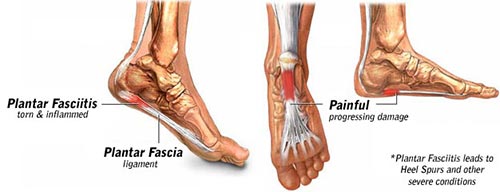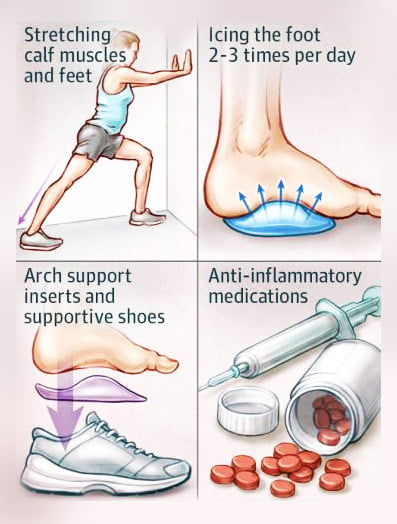Plantar fasciitis is a painful condition of the heel that results from inflammation of a band of tissue in your foot. Conservative treatment such as injections, stretching, orthotics, and physical therapy is usually successful in treating plantar fasciitis, however, some cases become surgical if prior treatment doesn’t provide relief of pain. Surgery typically involves releasing part of the tight plantar fascia and is performed in a surgical center under anesthesia. All symptoms, potential procedural and plantar fasciitis treatment options should always be discussed with a physician after a thorough consultation and examination for an accurate diagnosis and treatment plan.
Your plantar fascia is a thick band of connective tissue that runs along the bottom of your foot, connecting your heel to your forefoot. The fascia is similar to a ligament in that it can tear, thicken and become painful. The fascia may be injured by direct trauma or by constant strain over time. Fasciitis is the medical term for swelling or inflammation of your fascia tissue.
What Causes Plantar Fasciitis?

Plantar fasciitis can develop in anyone, but certain foot types have an increased tendency to develop this pain. Those with abnormally high or low arches are more at risk of developing plantar fasciitis as well as those who spend a lot of time on their feet.
Wearing flat, unsupportive shoes can increase your risk greatly, and those that are obese are especially prone to plantar fasciitis. People who are at a higher risk of developing this condition are mail carriers, teachers, nurses, runners, and others who stay on their feet for extended durations of time.
If you have a foot condition that you think may be plantar fasciitis, visit the best podiatrist in NYC for a full examination and diagnosis.
The main symptom of this condition is heel pain after periods of rest. Non-surgical or conservative treatment options are advised first. But if your pain does not resolve after 6 months, you may need plantar fasciitis surgery.
Is Plantar Fasciitis Surgery for You?
The effectiveness of the surgery for plantar fasciitis depends a lot on your overall health. If you are overweight, your foot doctor may recommend weight loss in conjunction with the surgery. This plantar fasciitis surgery is most appropriate if you can’t find relief with other treatments.If you have a foot condition that you think may be plantar fasciitis, visit the best podiatrist in NYC for a full examination and diagnosis.
”
★ ★ ★ ★ ★One of my best experiences with a foot surgeon in new york city. On time, friendly, no rush, really good listening where I was at, her explanations and diagnosis were on point! It definitely made my condition better
Plantar fasciitis doctor and our foot specialist offer a variety of newest options to treat plantar fasciitis, including endoscopic surgery. Plantar fasciitis surgery has a high success rate if performed by a board-certified surgeon. Endoscopic surgery is a more precise procedure with smaller incisions and thus has a faster recovery time. Complications are extremely low.
Come see the plantar fasciitis treatment center in Manhattan and meet our Podiatrists at Midtown podiatry, the top plantar fasciitis specialist in NYC. Experience, skill, knowledge, and compassion. Get the treatment you need in the safe, reassuring hands of the best plantar fasciitis surgery specialists. If you’re experiencing foot pain on the bottom of your heel and have been diagnosed with plantar fasciitis, you may require plantar fascia removal surgery. To be certain, schedule an appointment with the leading podiatrist.
Preparation for Plantar Fasciotomy Surgery
Before the procedure, you should have attempted stretching exercises and physical therapy first. In some cases, steroid or PRP injections may be attempted during the conservative treatment stage. Once surgical management becomes something that is being considered, you will be made aware of the risks involved with plantar fasciitis surgery.
The surgery for plantar fasciitis is a safe procedure, but adverse side effects may still occur, as they can in any surgical procedure, such as:
- Infection: You can typically avoid infection by properly caring for the surgical incision and replacing dressings as it heals.
- Form and function: Another risk is that the arch of your foot may be decreased if the fascia tension is relieved too much.
- Nerve damage: Surgeries can also cause temporary and permanent nerve damage, in this case in the fascia tissue.
- Continued pain: While most podiatrists are experts at releasing the fascia, there is a small chance that the surgery won’t end all of your heel pain.
The majority of patients who undergo foot surgery for plantar fasciitis experience a successful recovery but consider all the risks when discussing the option of surgery with a leading NYC foot surgeons.
Plantar Fasciitis Surgical Procedure
The surgeon may administer a local anesthetic to numb your foot for the surgery, and an anesthesiologist will be present to administer IV sedation. The plantar fascia is then released, allowing a visible difference in the arch when the big toe is extended upward.
There are risks associated with the plantar fasciitis surgery procedure and anesthesia. Blood clots, infection, and persistent pain are the some complications observed.
The main function of plantar fasciitis surgery is to relieve the tension of your plantar fascia. Your NYC foot surgeon cuts the plantar fascia tissue from a tiny incision, releasing the tension of the tissue. In rare cases, during plantar fasciitis surgery, it is necessary to remove the bone spur, a small incision is made around the pad of your heel, and the bone spur is removed. The plantar fasciitis surgery to lengthen the plantar fascia is called a fasciotomy, and it is commonly performed by foot doctors to treat heel pain. Heel spurs may also form from the pulling of the plantar fascia on the bone, but the source of the pain is typically the fascia itself and not the spur.
Endoscopic Plantar Fascia Surgery
A second surgical option in our office is endoscopic plantar fascia surgery. This is a procedure that uses a small camera to view the affected area. This type of surgery is performed by a surgeon or a highly experienced podiatrists who’s viewing a monitor that shows live images of inside your foot.
Recovery Time for Plantar Fasciitis Treatment
Plantar fasciitis surgery has a high success rate. Complications are extremely low. Your recovery time after the plantars fasciitis surgery varies, but you will typically spend a few weeks in a surgical shoe and may be advised to use a cane to help with stability and support when walking. Consult your podiatric doctor, but you may have to wait up to three months before you attempt any strenuous activity or exercise.
A podiatric or plantar fasciitis doctor in NYC may also recommend that you wear a brace or cast for two to three weeks after surgery to ease the weight on your foot and heel. This precaution allows the fascia tissue to heal properly. Endoscopic surgery is a more precise surgery with smaller incisions and thus has a faster recovery time. You may be able to walk without assistance after three to six weeks.
Alternative Treatments from Your Manhattan Podiatrist

If the thought of plantar fasciitis surgery makes you uneasy, seek out the best NYC podiatrist. You can learn about all the potential non-operative treatments for plantar fasciitis. These might include:
- Non-steroidal anti-inflammatory drugs (NSAIDs)
- Arch supports or custom orthotics for added support
- Losing weight to lessen the stress on your feet
Your Manhattan foot specialist can determine the cause of your foot pain with a simple exam and questions about your general health and heredity before ever considering foot surgery for plantar fasciitis unless it’s an emergency.
Do you have any questions about the Plantar Fasciitis Surgery procedure in NYC? Would you like to schedule an appointment with an internationally recognized, top NYC Podiatrist and plantar fasciitis doctor at Manhattan Foot Specialists? Please contact our office for a consultation.
Manhattan Foot Specialists (Midtown) 56 W 45th St, Ste 802, New York 10036
Manhattan Foot Specialists (Union Square) 55 W 17th St Ste 102, New York 10011
Manhattan Foot Specialists (Financial District) 80 Maiden Lane, Ste 1204, New York 10038
